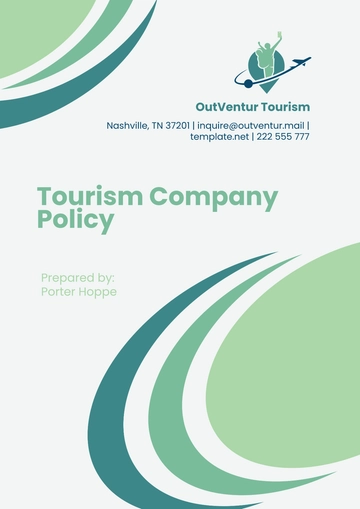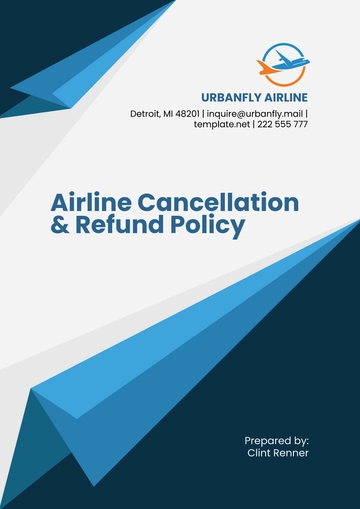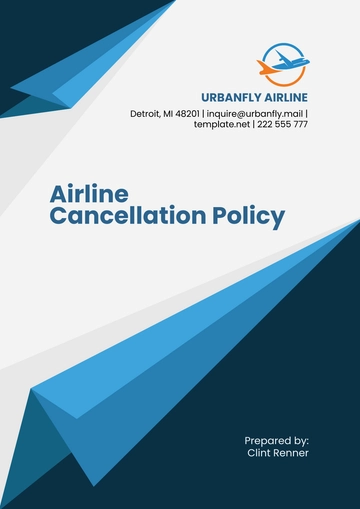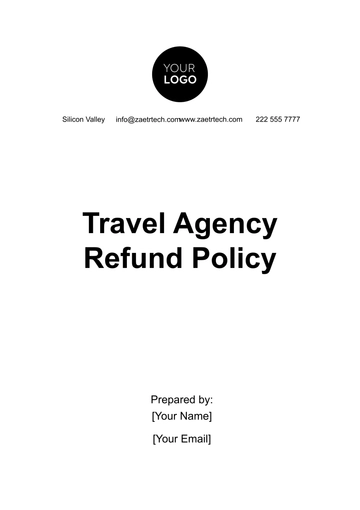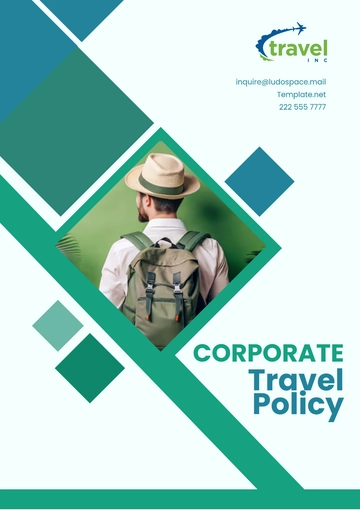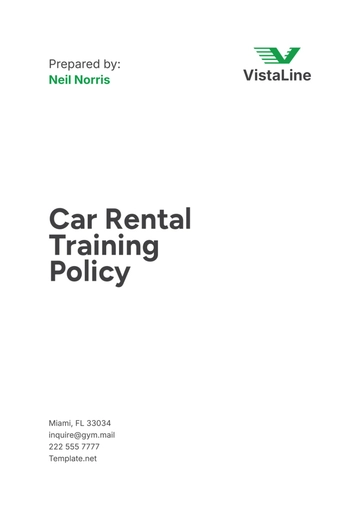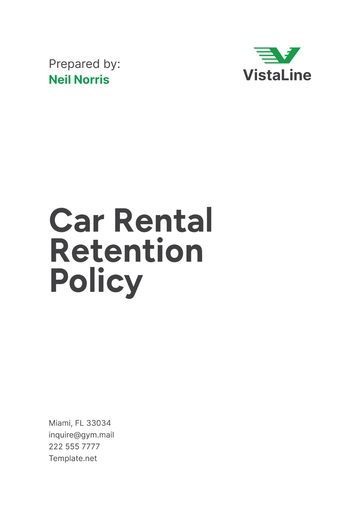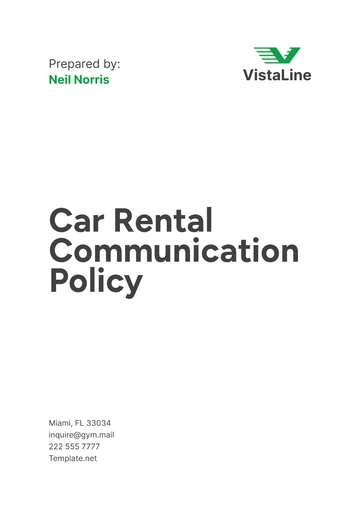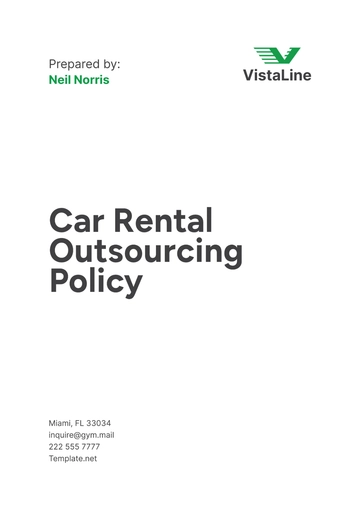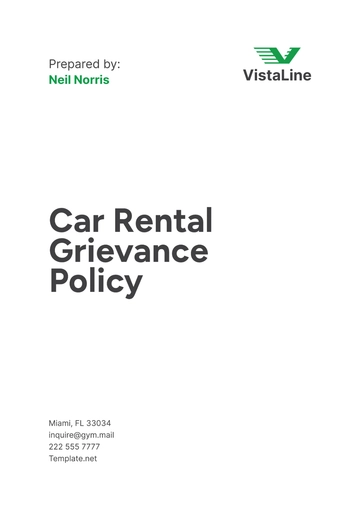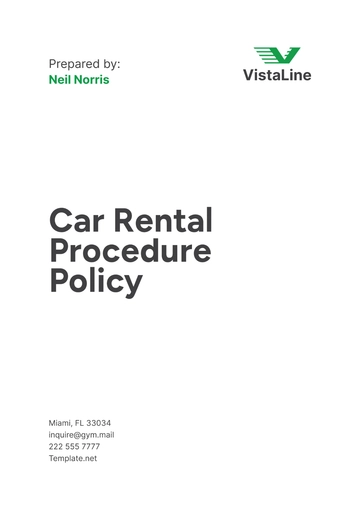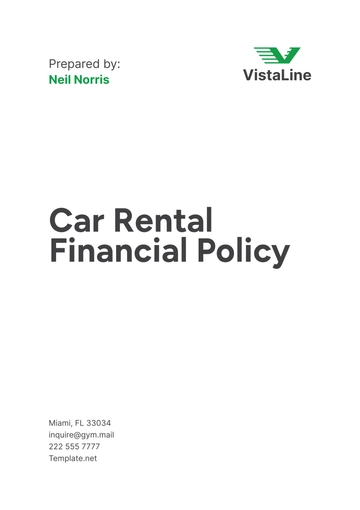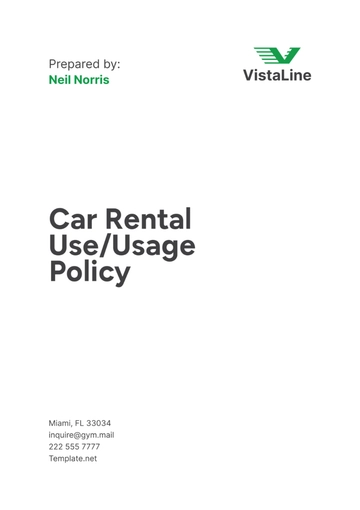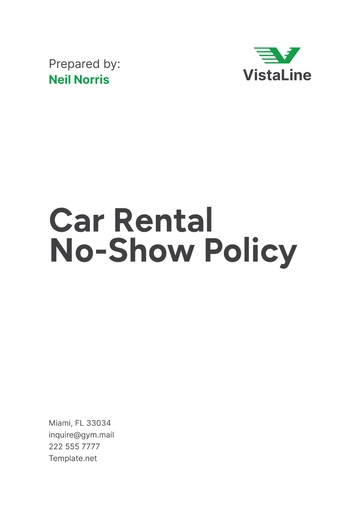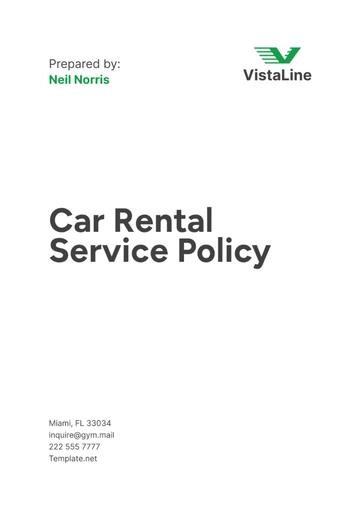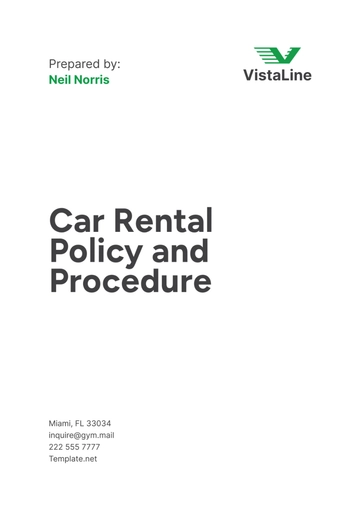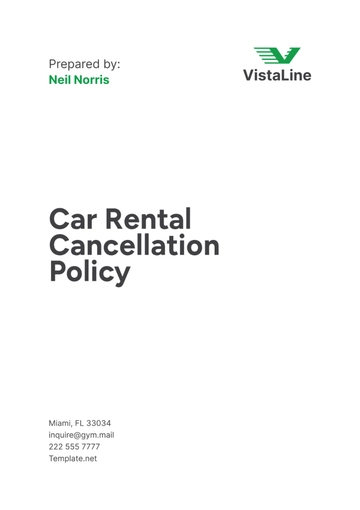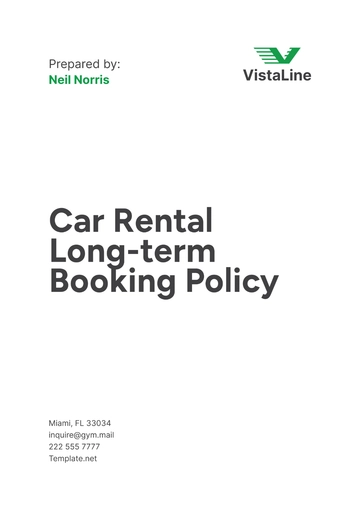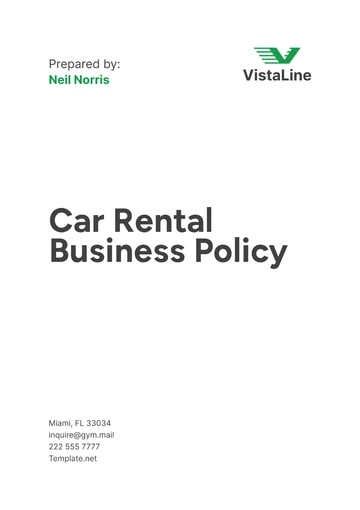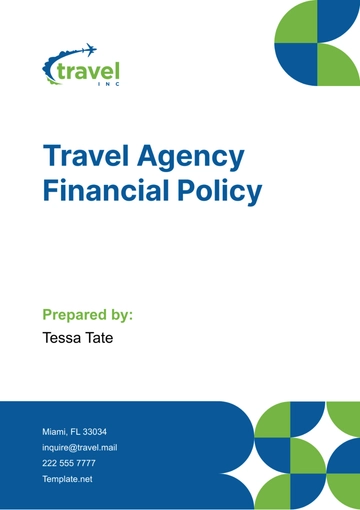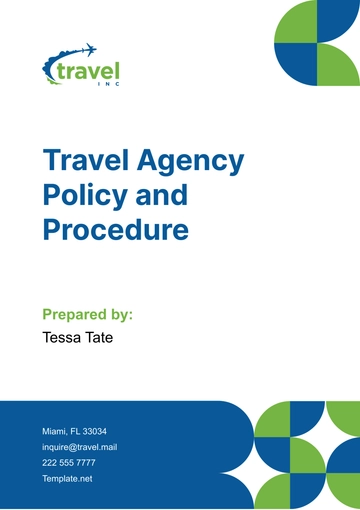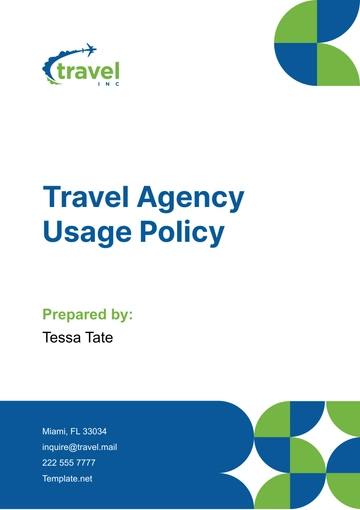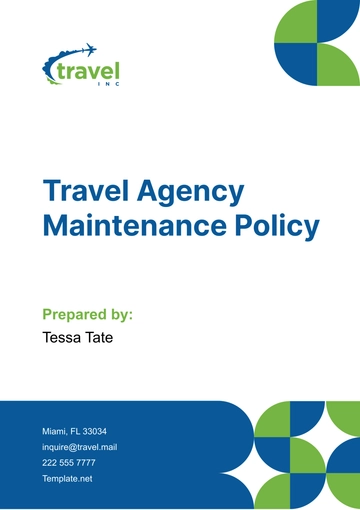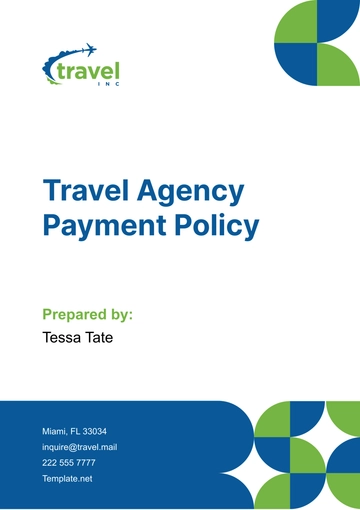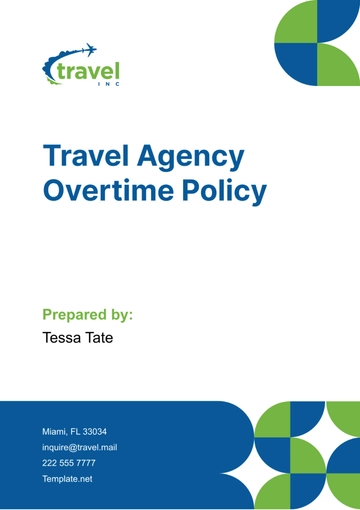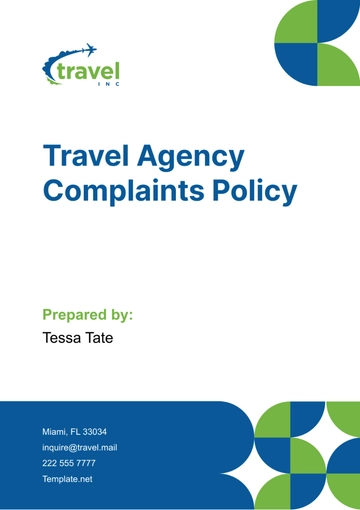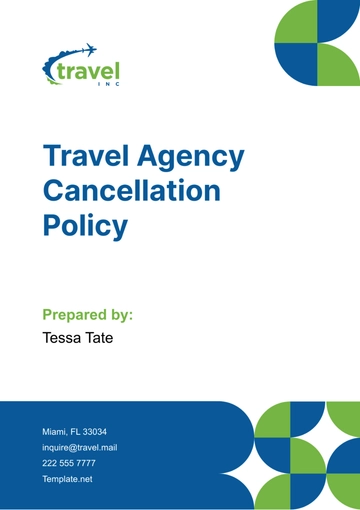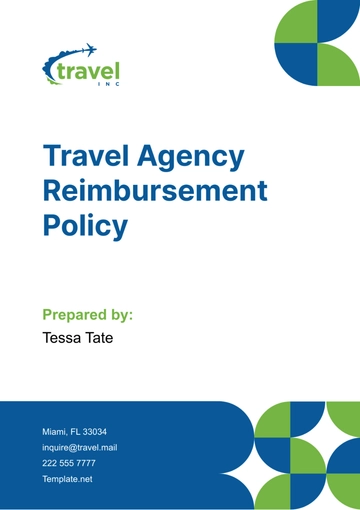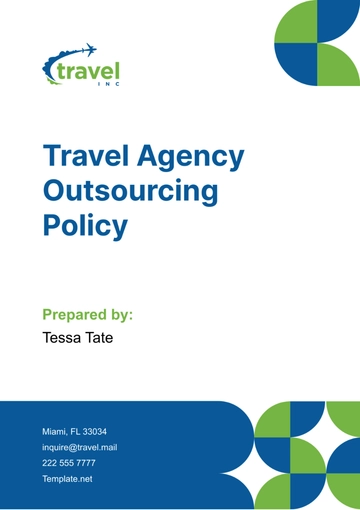Free Travel Agency Procedure Policy
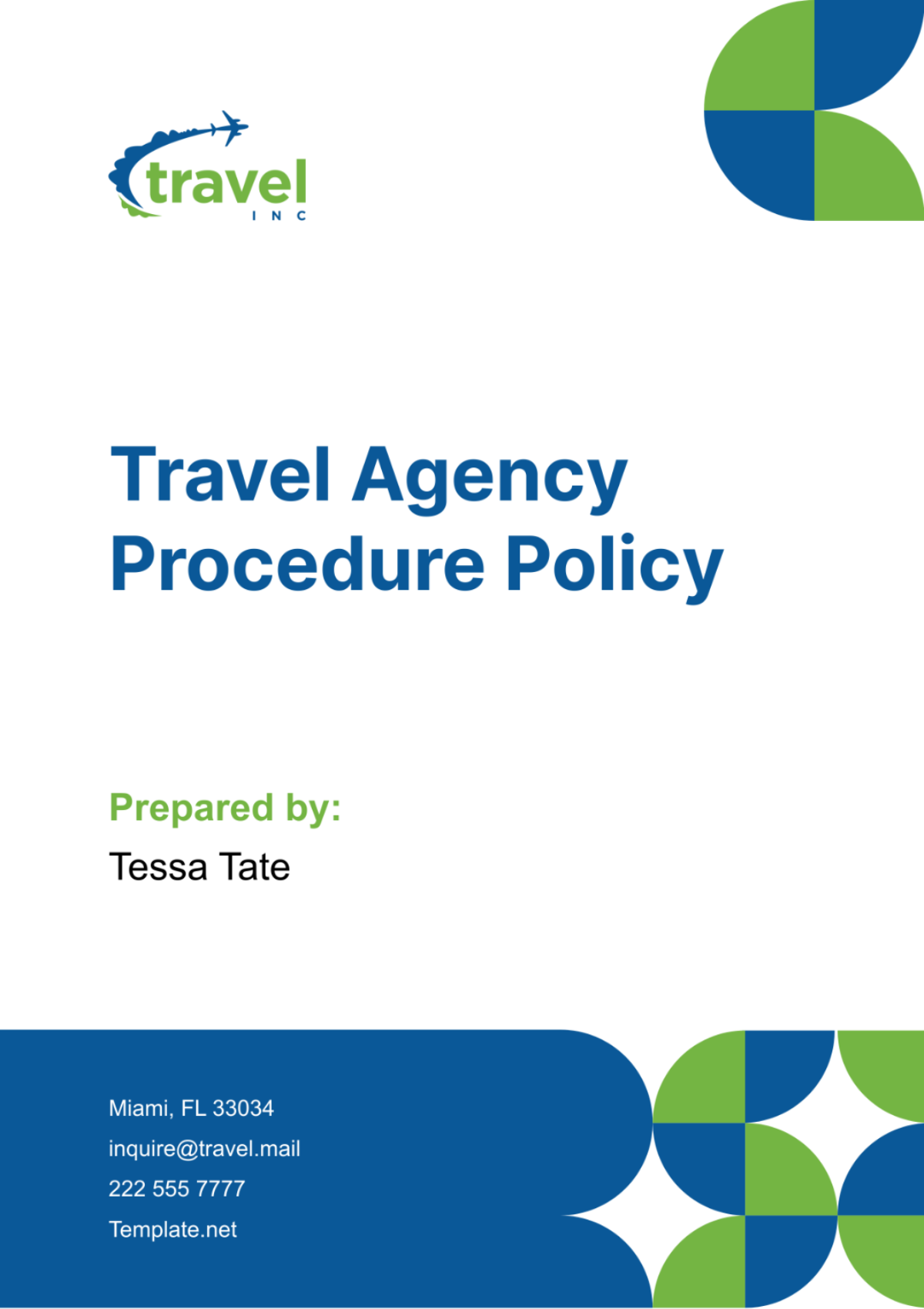
I. Introduction
A. Purpose
The purpose of this Travel Agency Procedure Policy is to establish guidelines and procedures for the efficient and effective operation of travel-related services provided by [Your Company Name]. This policy aims to ensure that all employees involved in travel planning and booking adhere to standardized practices, maintain high levels of customer satisfaction, and comply with relevant regulations and ethical standards.
B. Scope
This policy applies to all employees of [Your Company Name] who are responsible for planning, booking, and managing travel arrangements for clients. It encompasses procedures related to client consultation, research and planning, booking confirmation, documentation and record-keeping, financial procedures, quality assurance, compliance and ethics, training and development, and emergency procedures.
II. Booking Procedures
A. Client Consultation
Clients shall be consulted to determine their travel preferences, budgetary constraints, and any special requirements. This may include preferences for transportation modes, accommodation types, meal preferences, destination interests, and any specific needs such as accessibility or dietary restrictions.
Consultations may be conducted through various channels including in-person meetings, phone calls, video conferences, or online questionnaires. The objective is to gather comprehensive information to tailor travel plans to each client's unique preferences and needs.
B. Research and Planning
Travel agents shall conduct thorough research to identify suitable transportation, accommodations, and activities based on client preferences and budgetary considerations. This may involve researching airline options, hotel accommodations, ground transportation, tour packages, and other travel-related services.
Itineraries shall be meticulously planned and customized to meet the client's specifications. Agents shall consider factors such as travel dates, duration of stay, preferred destinations, sightseeing opportunities, and any special events or festivals taking place during the travel period.
Aspect of Travel | Description |
|---|---|
Transportation | Researching and selecting appropriate airline carriers, including considering factors such as price, route options, travel class, and loyalty programs. |
Accommodation | Identifying suitable hotel or lodging options based on client preferences for location, amenities, star rating, and budget constraints. |
Activities | Recommending and booking tours, excursions, and recreational activities based on client interests, such as cultural tours, adventure activities, or culinary experiences. |
Dining | Providing recommendations for dining options, including making restaurant reservations and accommodating dietary restrictions or preferences. |
Additional Services | Assisting with additional services such as travel insurance, visa processing, airport transfers, and special requests such as wheelchair assistance or childcare services. |
C. Booking Confirmation
Upon client approval of the proposed itinerary, travel arrangements shall be booked promptly and accurately. This includes securing reservations for flights, accommodations, tours, and other services as outlined in the agreed-upon itinerary.
Booking confirmations shall be promptly communicated to clients via their preferred method of communication, whether it be email, phone call, or messaging app. The confirmation shall include details such as flight itineraries, hotel reservations, tour bookings, and contact information for local representatives or service providers at the destination.
III. Documentation and Record Keeping
A. Client Records
Detailed records of client preferences, bookings, and communications shall be maintained in a secure and organized manner. This includes documenting all interactions with clients, including consultation notes, itinerary revisions, and any special requests or instructions provided by the client.
Client records shall be stored electronically in a secure database accessible only to authorized personnel. Information shall be kept confidential and used solely for the purpose of facilitating travel arrangements for the respective client.
B. Supplier Contracts and Agreements
Copies of supplier contracts and agreements shall be securely stored for reference and compliance purposes. This includes contracts with airlines, hotels, tour operators, transportation providers, and other service vendors.
Contracts shall be reviewed periodically to ensure compliance with terms and conditions, including pricing agreements, cancellation policies, and service level agreements.
Supplier | Contract Details | Review Frequency |
|---|---|---|
Airlines | Agreements outlining fare structures, booking policies, and commission rates. | Annually |
Hotels | Contracts specifying room rates, amenities, cancellation policies, and commission agreements. | Bi-annually |
Tour Operators | Agreements detailing tour packages, excursion options, and commission structures. | Quarterly |
Transportation Providers | Contracts outlining transportation services, vehicle types, and pricing arrangements. | Bi-annually |
Other Service Vendors | Contracts for additional services such as travel insurance, visa processing, and airport transfers. | As needed |
IV. Financial Procedures
A. Payment Collection
Payment for travel services shall be collected from clients in accordance with established payment terms. This may include collecting full payment upfront or securing deposits at the time of booking, depending on the nature of the travel arrangements and supplier requirements.
Secure payment methods shall be utilized to protect client financial information. Payment options may include credit card payments, bank transfers, or online payment gateways with built-in encryption and security protocols.
B. Refund and Cancellation Policies
Clear policies regarding refunds and cancellations shall be communicated to clients prior to booking. This includes outlining any applicable penalties or fees associated with cancellations or changes to travel plans.
Refunds shall be processed promptly and in accordance with applicable terms and conditions. Agents shall work closely with suppliers to expedite refund requests and ensure timely reimbursement to affected clients.
V. Quality Assurance
A. Client Feedback
Feedback from clients regarding travel experiences shall be actively solicited and documented. This may be done through post-travel surveys, follow-up emails, or direct communication with clients.
Feedback shall cover various aspects of the travel experience including transportation, accommodations, activities, and overall satisfaction with the services provided.
B. Supplier Evaluation
Suppliers of travel services shall be evaluated based on factors such as reliability, customer service, and value for money. This evaluation may include analyzing customer reviews, monitoring service quality during client trips, and conducting regular performance reviews with suppliers.
Feedback and evaluations shall inform decisions regarding ongoing supplier relationships, including contract renewals, renegotiations, or sourcing alternative suppliers if necessary.
Supplier | Evaluation Criteria | Evaluation Method |
|---|---|---|
Airlines | Punctuality, customer service, onboard amenities, and reliability of flight operations. | Customer surveys, flight performance data analysis. |
Hotels | Cleanliness, comfort, customer service, amenities, and adherence to booking terms. | Guest reviews, on-site inspections, mystery shopper evaluations. |
Tour Operators | Quality of tour guides, itinerary execution, safety standards, and customer satisfaction. | Client feedback, tour evaluations, safety audits. |
Transportation Providers | Vehicle condition, driver professionalism, punctuality, and adherence to itinerary schedules. | Client feedback, driver performance assessments. |
Other Service Vendors | Efficiency of service delivery, responsiveness to inquiries, and customer satisfaction. | Client feedback, service level agreement compliance checks. |
VI. Compliance and Ethics
A. Regulatory Compliance
Travel agents shall adhere to all applicable laws and regulations governing the provision of travel services. This includes compliance with local, national, and international regulations related to travel documentation, consumer protection, and business licensing.
Compliance with industry standards and best practices shall be maintained at all times to ensure the legality and ethical conduct of [Your Company Name]'s operations.
B. Ethical Conduct
Employees shall conduct themselves with integrity and professionalism in all dealings with clients, suppliers, and colleagues. This includes providing accurate information, avoiding conflicts of interest, and prioritizing the best interests of clients.
Conflicts of interest shall be disclosed and managed appropriately to ensure impartiality and fairness in decision-making processes.
VII. Training and Development
A. Continuous Education
Ongoing training and professional development opportunities shall be provided to employees to enhance their knowledge and skills in the travel industry. Training programs may cover a range of topics including destination knowledge, sales techniques, customer service, and use of booking systems.
Training sessions may be conducted through various formats such as in-person workshops, online courses, webinars, and guest speaker presentations to accommodate different learning styles and preferences.
B. Certification
Employees may be encouraged to pursue relevant certifications or accreditations to demonstrate competency and expertise in specific areas of the travel industry. Certifications may include those offered by organizations such as the International Air Transport Association (IATA), Cruise Lines International Association (CLIA), or the Travel Institute.
[Your Company Name] may support employees in obtaining certifications by providing financial assistance for exam fees, study materials, and training programs, as well as granting study leave or flexible work hours to accommodate exam preparation.
Training Topic | Description | Training Format |
|---|---|---|
Destination Knowledge | Training on popular travel destinations, local attractions, cultural practices, and travel tips to better assist clients in planning their trips. | In-person workshops, online courses. |
Customer Service | Training on effective communication skills, conflict resolution techniques, and strategies for providing exceptional service to clients. | Role-playing exercises, customer service simulations. |
Booking Systems | Training on the use of booking platforms, reservation systems, and online travel agencies to efficiently manage travel bookings and reservations. | Hands-on training, online tutorials. |
Sales Techniques | Training on sales strategies, upselling techniques, and negotiation skills to increase sales conversion rates and maximize revenue. | Sales role-play scenarios, sales pitch practice. |
VIII. Emergency Procedures
A. Crisis Management
Protocols for responding to emergencies such as natural disasters, political unrest, or health crises shall be established and communicated to employees. This includes procedures for assessing risks, communicating with clients, and coordinating emergency assistance.
Contingency plans shall be developed to minimize disruption to clients and ensure their safety and well-being in the event of an emergency. This may include evacuation procedures, emergency contact lists, and alternative travel arrangements.
B. Communication
Clear communication channels shall be maintained with clients and suppliers during emergencies to provide updates and assistance as needed. This includes establishing emergency contact numbers, email distribution lists, and communication protocols.
Emergency contact information for clients and suppliers shall be readily accessible to facilitate communication in urgent situations. This information shall be securely stored and regularly updated to ensure accuracy.
IX. Conclusion
This Travel Agency Procedure Policy outlines the standards and protocols to be followed by employees of [Your Company Name] in the provision of travel services. Adherence to these procedures is essential to ensure the delivery of high-quality, customer-centric services and maintain the reputation and integrity of the company in the travel industry. By implementing these policies, [Your Company Name] aims to provide seamless travel experiences for clients while upholding the highest standards of professionalism, compliance, and ethical conduct.
- 100% Customizable, free editor
- Access 1 Million+ Templates, photo’s & graphics
- Download or share as a template
- Click and replace photos, graphics, text, backgrounds
- Resize, crop, AI write & more
- Access advanced editor
Ensure consistent operations with Template.net's Travel Agency Procedure Policy Template. This customizable document provides a structured framework for outlining procedures and protocols across various aspects of your agency's operations, including booking, customer service, and administrative tasks. Crafted by industry experts, it ensures clarity and standardization in procedures. Editable in our Ai Editor Tool for seamless customization and integration into your agency's policies and procedures manual.
You may also like
- HR Policy
- Restaurant Policy
- Company Policy
- Accounting Policies and Procedures
- Website Policy
- Privacy Policy
- Safety Policy
- School Policy
- IT and Software Policy
- Law Firm Policy
- Construction Policy
- Interior Design Policy
- Travel Agency Policy
- Education Academic Policy
- Security Policy
- Real Estate Policy
- Expense Policy
- Software Policy
